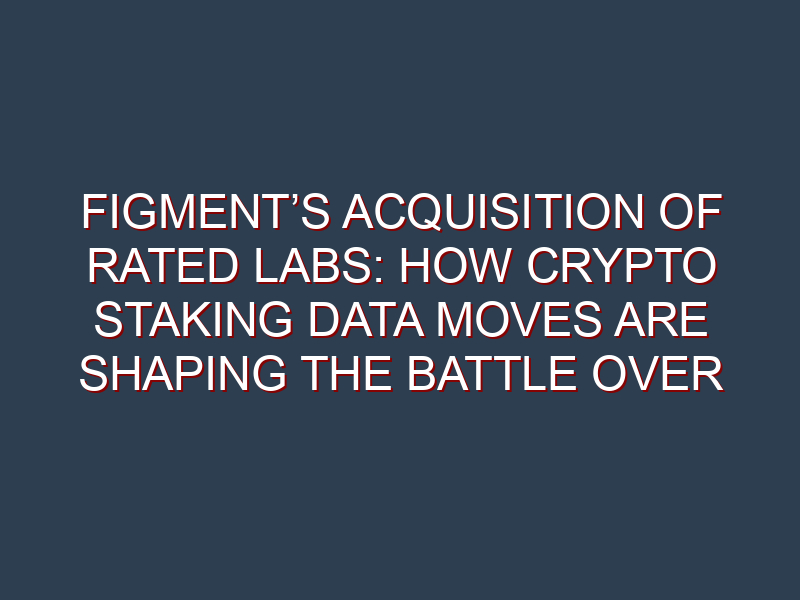Figment’s Strategic Acquisition: A New Front in the Crypto Regulatory Debate
When Figment announces its acquisition of Rated Labs, it might sound like a routine business development in the fast-paced world of blockchain. But beneath the surface, this move is a clear signal to lawmakers, regulators, and the broader financial system: the crypto industry is gearing up for a policy showdown, armed with more sophisticated data and a growing influence among institutional players.
Data Power: Why Lawmakers Are Watching Institutional Crypto Moves
Why does this acquisition matter politically? Figment’s focus on providing more granular and reliable staking data for institutional clients aligns with the ongoing debates in Washington over how—and whether—to regulate crypto staking. Staking, while a core component of Proof-of-Stake blockchain networks, has become a political flashpoint. Policy makers at the Securities and Exchange Commission (SEC) and the Commodity Futures Trading Commission (CFTC) continue to argue over which agency should take the lead, raising broader questions about the future shape of digital asset regulation in the United States.
Reliable, independent data is now a weapon in this fight. Lawmakers and regulators demand transparency and actionable intelligence to craft rules that could shape, or stifle, the industry. By controlling a key node of crypto analytics through Rated Labs, Figment is not just serving its institutional customers—it’s making a play for influence in how these regulations are ultimately drafted and enforced.
Institutional Leap: Crypto’s Lobby and the Policy Chessboard
As Wall Street institutions show renewed confidence in digital assets, traditional finance is pushing for clear, consistent rules. The consolidation of staking data capabilities by Figment speaks to a broader, bipartisan expectation: Republicans and Democrats in Congress agree that robust data and auditability are prerequisites for any responsible regulatory framework. Moves like this acquisition will likely increase crypto’s sway as lawmakers consider bills like the Financial Innovation and Technology for the 21st Century Act and proposed SEC rulemakings.
Meanwhile, both sides of the aisle are mindful of both innovation and consumer protection. Democrats have publicly pressed the U.S. Treasury and the SEC to develop tougher disclosure standards for crypto products, while some GOP lawmakers argue existing regulations threaten American competitiveness in digital finance. With ever more sophisticated data analytics in their corner, crypto advocates like Figment and Rated Labs are putting themselves at the table where these rules will be written.
What’s Next: Data Wars and the Future of Crypto Legislation
This deal is about more than customer service—it’s about the shape of the playing field for 2025 and beyond. The question now: will Figment’s expanded data toolkit simply empower its institutional clients, or will it reshape the conversation in Washington about how staking, yield products, and blockchain infrastructure are regulated?
One thing is clear: Figment’s move is both an answer to current regulatory uncertainty and an attempt to shape its outcome. As regulatory agencies like the SEC and CFTC continue to jostle for authority, and as lawmakers plot the next chapter of financial innovation policy, the crypto industry isn’t waiting on the sidelines. Instead, it’s investing in the data and tools needed to influence the next round of regulatory—and political—debate.





